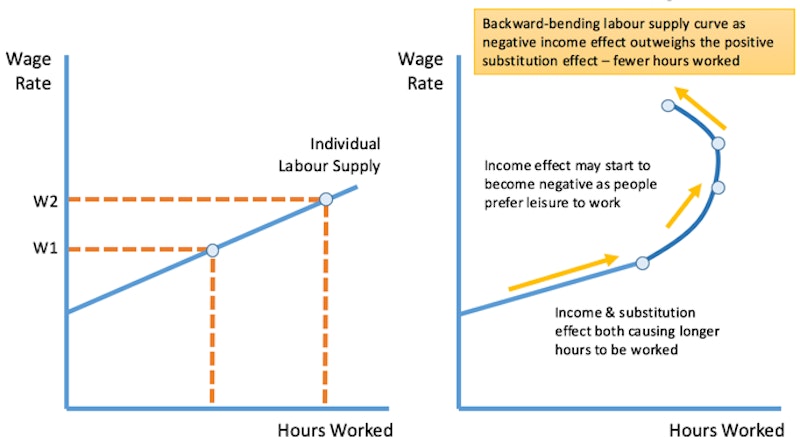Study Notes
Wage Rises - Income & Substitution Effects (Labour Markets)
- Level:
- A-Level, IB
- Board:
- AQA, Edexcel, OCR, IB, Eduqas, WJEC
Last updated 3 Feb 2023
This analysis looks at the individual labour supply decision and in particular the work-leisure trade off and how this is affected by a change in wages.
- Most individuals face a choice between hours worked and hours of leisure
- The opportunity cost of taking leisure is the monetary value of the wages foregone
- A change in the wage rate has both an income effect and a substitution effect
The income effect of a rise in the hourly wage rate
- Positive income effect: When higher wages cause people to want to work more hours in order to reach a target / desired income
- Negative income effect: When a target income has been reached and people prefer spending more time on leisure rather than earning more income
The substitution effect of a rise in the hourly wage rate
- A rise in the real wage increases the opportunity cost of leisure
- Therefore higher wages will always cause people to be incentivised to work longer hours via the substitution effect
- But the income effect may work in the opposite direction

Some people may have a backward bending individual labour supply curve – they may choose to work fewer hours when the wage rate rises (ceteris paribus)

You might also like

The Happy Band of the Self Employed
15th October 2014

Working more or less - technology and the work-life balance
16th February 2015
Labour Force Participation (Labour Markets)
Study Notes

Will a fall in labour migration hurt the UK economy?
29th December 2016
Labour Migration and the UK Economy (Labour Markets)
Topic Videos

Inside the Amazon Warehouse - Monopsony under Scrutiny
11th November 2018
Explaining the Work-Leisure Trade-Off
Study Notes
Daily Email Updates
Subscribe to our daily digest and get the day’s content delivered fresh to your inbox every morning at 7am.
Signup for emails